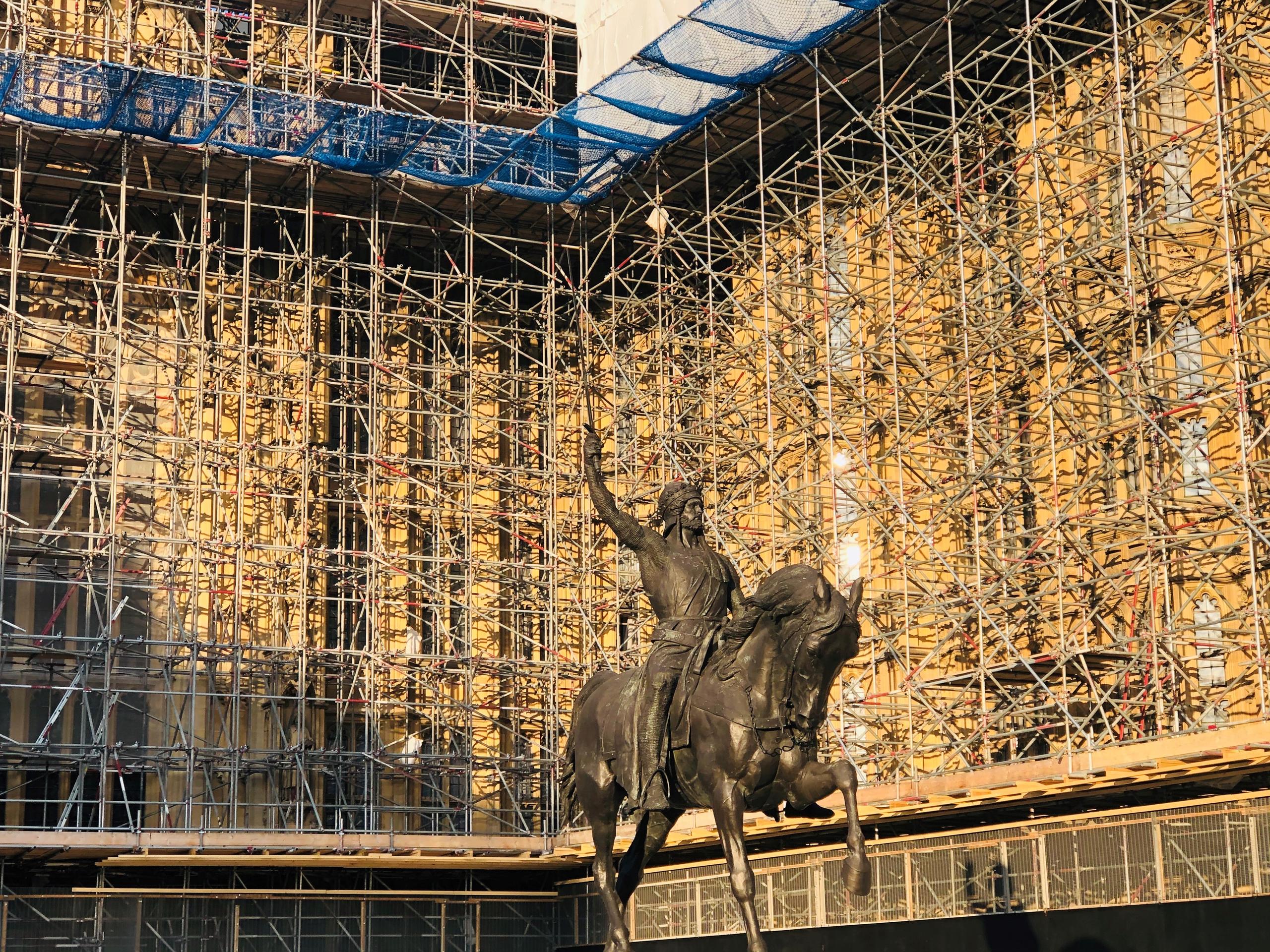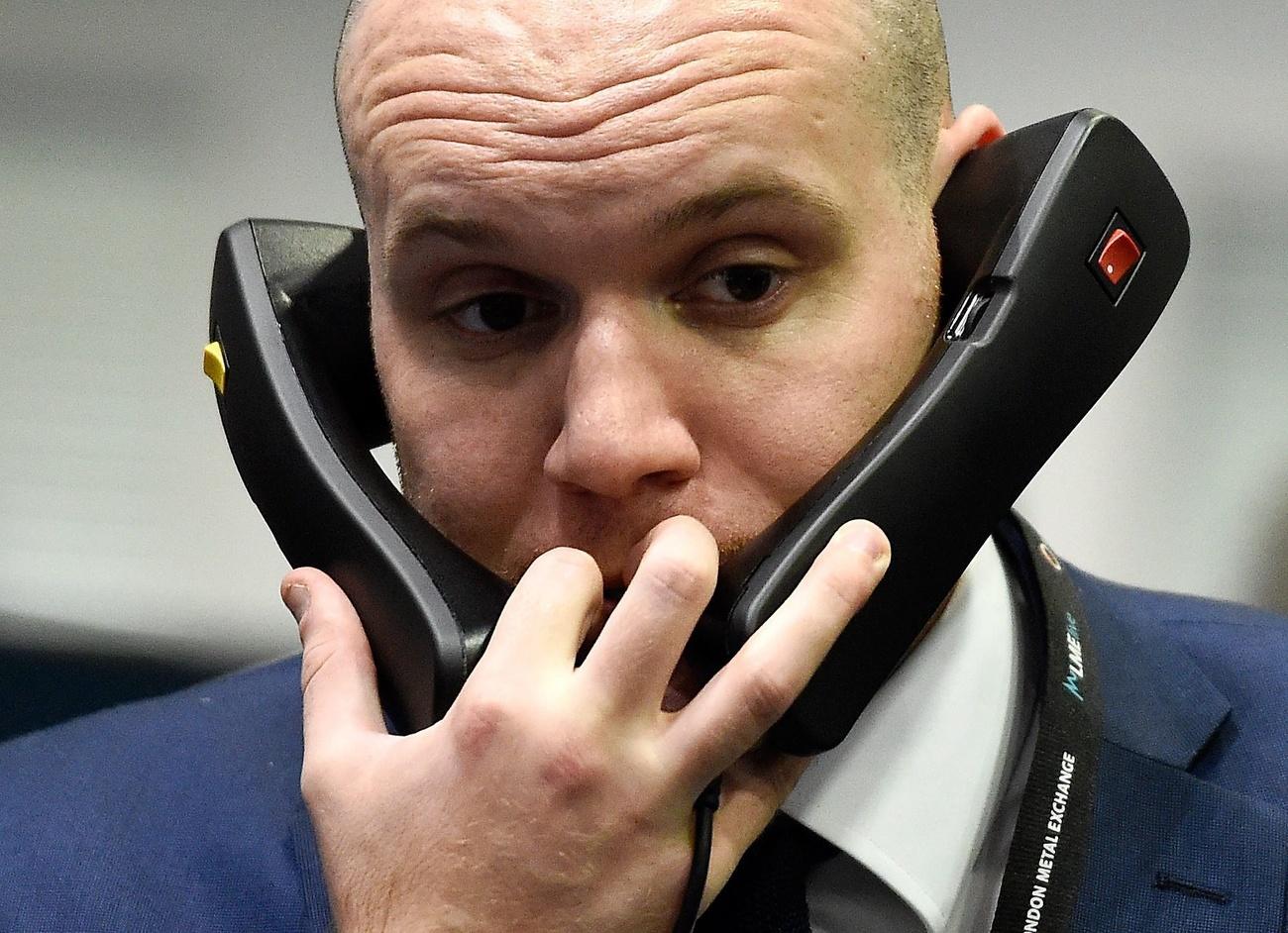No sign of an end to Britain’s messy democratic order

As Europe’s only country without a written constitution, the United Kingdom has endured a bumpy ride towards modern democratic politics. Even with a Brexit solution finally in the making, Britain’s hunger for more citizen participation – such as a Swiss-style referendum on implementation – remains an issue.
This is a work in progress. Literally.
Visitors to London’s Westminster parliament currently have a hard time identifying one of the world’s most iconic buildings. Scaffolding covers most of the 1,100-room palace, as well as the adjoining Elizabeth Tower – home of Big Ben.
The first building blocks of Westminster were laid as far back as 1097, and since then it’s where much of the action in Britain’s conflict-ridden politics has happened. However, having been unable for more than three years to agree on how to implement the June 2016 citizen vote to leave the European Union, the democratic action has moved outside the 650-member parliament. The famous “orderrrr!” calls by John Bercow have fallen silent, after the long-term speaker resigned and Parliament was dissolved on November 6.
On a rainy and grey November day hundreds of protesters are present just beyond the massive concrete blocks protecting the construction site of the House of Commons. Mirroring the post-Brexit polarisation, they hold signs reading “Leave means leave”, “Revoke Article 50”, “Brexit Now”, “Stop Brexit”, “Get Britain Out”, “Brexit Must Die in a Ditch”.
People from all walks of life are here: men, women, old and young, fathers with children and students with origins around the world.
‘Stop the Brexit Mess!’
One sign stands out above all: “Stop the Brexit Mess!”. Not because somebody in particular is holding it; in fact nobody is – it hangs on an electricity pylon in the middle of the shouting crowd. It feels like a signal from a silent majority, sick of the endless and fruitless attempts within parliament to come up with a proposal on how to leave the EU.
Indeed, according to recent pollsExternal link, more than two-thirds of Britons think that the conservative government of the country has handled the process to leave the EU “badly”. Meanwhile, around half believe it was “wrong” to vote Leave in 2016, with around 40% still reckoning it was the “right” decision. And a summary of more than 85 different polls by the National Center of SocialExternal link Research finds that 53% of peopleExternal link indicate they would now vote “remain” in a “second referendum”, while 47% are on the “leave” side.
Such numbers play very differently into the thoughts and strategies of political groups organised around the new dividing lines in Britain.
“There is no way around a second, confirmatory vote”, says Tom Cole from the newly established “People’s Vote”External link campaign. I met him in Miliband Tower just outside Westminster, where his organisation of around 60 full-time staff are busy preparing a “tactical vote” at the forthcoming “Brexmas” General Election on December 12. Such a second referendum is according to Cole not about “reversing” the June 2016 poll, but about putting to the test the Brexit agreement negotiated with the EU.
Cole refers to Switzerland, where a first decision taken by the people on a constitutional amendment often leads towards a statutory referendum on an implementation law. As a consequence of the “People’s Vote” campaign, remain-leaning forces like the Liberal Democrats, the Greens as well as the Welsh nationalist Plaid Cymru have joined in cooperation across the country.
And the same happens on the other side of the Brexit trench: Nigel Farage, for years one of the most outspoken leavers, has called off his attacks on the governing conservatives ahead of the election; his Brexit Party will only run candidates in Labour-run constituencies, mainly in Northern England.
Britain’s traditional government parties – Labour and the Tories – are however showing much less appetite to enter Brexit-driven arrangements as they try to find a path back to the old and less messy period of British politics, in which one or the other party – by gaining a relative majority in the polls – could win a majority in the Commons and with that, some of the most comprehensive executive powers any government in a democratic country could have.
But such times – often called the age of “elective dictatorship” – have disappeared.

Thatcher – the last “elected dictator”
Possibly the last such “elected dictator” was Margaret Thatcher, who centralised all powers to 10 Downing Street – the office of the Prime Minister – and only was ended by internal political revolution and the Iron Lady leaving in tears.
During her years in office (1979-1990) Thatcher not only kept a distance from Europe, but also from any kind of democratic reform. However, as the European Community evolved into the more political European Union and the UK became more diverse, calls for decentralised powers and more direct democracy become louder. As a consequence, a growing number of nationwide, regional and local referendums have been held in the last 25 years, including autonomy and independence ballots in Scotland, Wales and Northern Ireland.
Nigel Smith, a former businessman from Scotland, is one of the few British expertsExternal link on practical direct democracy, having gotten involved early on in the 1997 Scottish Devolution Referendum. He also later helped election commissions to prepare and conduct popular votes like the Good Friday Referendum in Ireland, the 2011 UK-wide referendum on electoral reform and the 2014 Scottish Independence referendum.
“Our main problem is that governments are misusing their powers in referendums,” says Smith. “Most such popular votes are happening because there is a split within a political party or a government coalition.”
While certain basic rules have been introduced to regulate a referendum process (e.g. the UK election and referendum act),External link the power to initiate a popular vote still lies exclusively with the power-holding party.
In addition, most direct democratic process in the UK are still organised on a case-per-case basis, offering the government of the day various opportunities to manipulate the process. And as “the elites inside and outside parliament totally lost control of the process after Brexit”, the arguments for introducing more participatory and direct democratic rights has not been strengthened, reckons Smith.
However, at the other end of the scale, among UK citizens the appetite for involvement has not diminished. A recent YouGov pollExternal link shows that 47% are in favour of a second Brexit-vote while 29% are against. And in Scotland – where 55% voted against independence from the UK in 2014, a public Citizens AssemblyExternal link is currently deliberating whether or not to hold a second such vote.
Even if it looks like the Brexit issue could be solved at some point in 2020, the messy order of British politics is most likely to continue.
Join us: Brexit and direct democracy event
On December 2, SWI swissinfo.ch will host a panel discussion about how direct democracy led to Brexit, how the outcome might affect citizen participation in the UK, what Swiss parallels can be drawn, and how direct democracy is shaping up around the world more broadly.
The event will include input from:
Patrick Emmenegger, Professor of Public Policy at the University of St Gallen
Henriette Engbersen, UK correspondent, Swiss Public Television SRF
Bruno Kaufmann, SWI swissinfo.ch global democracy correspondent
Clare O’Dea, Irish journalist and author of The Naked Swiss: A Nation Behind 10 Myths
More details and free registration for the event can be found here.External link
A livestream will also be available at swissinfo.ch.

In compliance with the JTI standards
More: SWI swissinfo.ch certified by the Journalism Trust Initiative












You can find an overview of ongoing debates with our journalists here . Please join us!
If you want to start a conversation about a topic raised in this article or want to report factual errors, email us at english@swissinfo.ch.